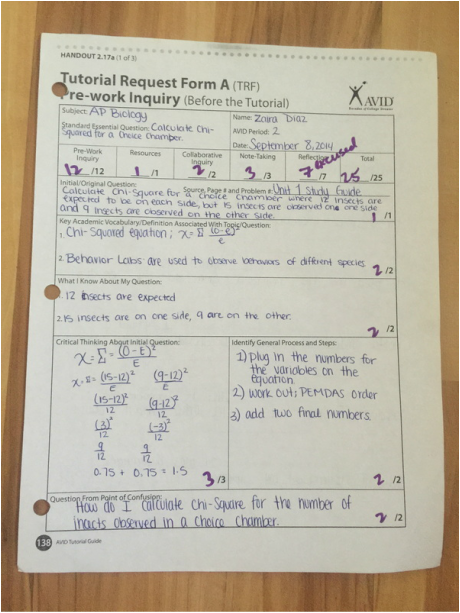*************************
Homework:
-Make sure your binder is well set up!
 -Want a public speaking opportunity? On Thursday, February 16th in the Civic Center, the district level AVID program will host an AVID Information Night. You'll get to tell younger students how AVID helps you and how AVID is unique at LEC. Want to get involved? Copy and fill out the document here (log in to your Lee County email to have access). Share it with Ms. Foster (mnickel.lec@lee.k12.nc.us) by Friday, 27 January.
-Want a public speaking opportunity? On Thursday, February 16th in the Civic Center, the district level AVID program will host an AVID Information Night. You'll get to tell younger students how AVID helps you and how AVID is unique at LEC. Want to get involved? Copy and fill out the document here (log in to your Lee County email to have access). Share it with Ms. Foster (mnickel.lec@lee.k12.nc.us) by Friday, 27 January.
 -Want a public speaking opportunity? On Thursday, February 16th in the Civic Center, the district level AVID program will host an AVID Information Night. You'll get to tell younger students how AVID helps you and how AVID is unique at LEC. Want to get involved? Copy and fill out the document here (log in to your Lee County email to have access). Share it with Ms. Foster (mnickel.lec@lee.k12.nc.us) by Friday, 27 January.
-Want a public speaking opportunity? On Thursday, February 16th in the Civic Center, the district level AVID program will host an AVID Information Night. You'll get to tell younger students how AVID helps you and how AVID is unique at LEC. Want to get involved? Copy and fill out the document here (log in to your Lee County email to have access). Share it with Ms. Foster (mnickel.lec@lee.k12.nc.us) by Friday, 27 January.
**************************
Big Idea: Structures provide organization
Essential Question: How can I succeed in school this semester?
Objectives: I can...
...correct sentences using rules about apostrophes.
...write a Tutorial Request Form.
...plan how you use Tutorials this semester.
...set and meet a short-term personal goal.
...write a Tutorial Request Form.
...plan how you use Tutorials this semester.
...set and meet a short-term personal goal.
**************************
- Set up a note sheet. EQ: How can I succeed in school this semester? Topics: Apostrophes and Tutorials
- Choose to do one of the grammar exercises below. Both are about apostrophes.
- As you work through the exercises, list apostrophe rules you figure out based on the correct answers. Stuck on figuring out rules? Read through the sheet here and record three of the rules in your own words in your notes.

2) Literacy Block: Writing a TRF (25 min)
- Before writing a TRF:
- White Board Discussion: Answer the following questions with your group on your whiteboard. Visit other whiteboards and add comments, questions, stars, etc.
- Think back to yesterday's writing prompts. What are some important questions for us to ask ourselves? Others?
- What roles can questions play in school? In your personal life? When you talk to friends? When you are trying to do something new? In your future career?
- Skeptic/Lobbyist:
- Stand Up-Hand Up-Pair Up. Choose pizza or tacos.
- One partner will be the lobbyist first. Lobbyists need to talk for 30 seconds trying to convince the silent-yet-dramatic skeptic that questions are better than telling during Tutorials.
- Switch roles.
- TRFs in Special Situations:
- When are TRFs and Tutorials most helpful?
- What can you write TRFs about if you are not confused about anything?
- Where can you find tough and interesting questions?
- While writing a TRF:
- What goes in the header? Initial question box? Key term box? What you know box? Take 5 minutes to fill this in.
- What goes in the critical thinking and process boxes? Discuss types of organizers that may be helpful. Take 7 minutes to fill these in.
- What should be included in your POC? What is the format of a POC? What if you've figured it out by now and have a concept rating of 4? Take 3 minutes to fill this in.
- After writing a TRF: List what an effective and less effective Tutorial looks and sounds like.

3) Lesson Plan: Mini-Tutorial Jigsaw (30 min)
4) Exit Ticket/Closure: Time for YOU!
Use remaining class time to...
- Break into four groups by numbering off.
- Complete a TRF for your assigned initial question. Do this on big paper.
- Time Permitting: Choose one person to act out being the presenter and go through the Tutorial.
- Share with your group: When would your tutorial type be helpful? What are some tips you have for writing a successful TRF?
- Return to your table and discuss, again, when each tutorial type would be helpful.
- Write me a sticky note with the following info:
- Your name
- The type of tutorial you think you will use most often
- What class you predict most of your TRFs will be about
- If you need resources for questions, let me know!

Tutorial Style
|
Initial Question
|
Questions to consider as you write your TRF
|
Group 1: Traditional Tutorial
|
Suppose a compressed-air cannon fires a pumpkin straight up into the air from a height of 20 feet and provides an initial upward velocity of 90 feet per second. The path the pumpkin follows is modeled by the equation h(t)=-16t2+90t+20.
a) What is the maximum height of the pumpkin? Round to the tenth.
b) When does this occur? Round to the tenth.
c) When will the pumpkin hit the ground? Show how you found your answer. Round to the tenth.
|
-What kind of graphic organizer can help you plan your steps?
-Would it help to draw a diagram?
-What steps do you need to use?
-What formulas do you need? What do the variables and constants in the equation mean?
|
Group 2: ACT Preparation Tutorial
|
From the ACT PLAN English Test released practice items:
...You will find alternatives for the underlined part. In most cases, you are to choose the one that best expresses the idea, makes the statement appropriate for standard written English, or is worded most consistently with the style and tone of the passage as a whole. If you think the original version is best, choose “NO CHANGE.”
[4] Why Griffith asked, can’t the camera be our eyes? [5] Why can’t we have close-ups of the faces of
5.
A. NO CHANGE
B. Why? Griffith asked, can’t
C. Why? Griffith asked. Can’t
D. Why, Griffith asked, can’t
|
-What is the question asking you to do?
-What are strategies you can use to determine the best answer?
-Do you know any grammar rules that relate to this question?
-What, if any, grammar rules does this sentence break?
|
Group 3: Revision Planning Tutorial
|
Prompt from teacher: Write a TPEQEA paragraph responding to the prompt: Why do river civilizations draw the creation of civilizations?
Feedback from teacher: Redo. Your point sentence makes a strong and relevant claim. Your quote is not formatted correctly, and you need an in-text citation. Revisit your elaboration sentence and make sure it connects your quote, example, and point without restating them.
|
-Can you create a graphic organizer that shows (a) what information you need to include in your TPEQEA paragraph, (b) steps to improving your paragraph, (c) proper quote and citation formatting?
-Do you remember how to format quotes and citations?
-What are some questions you can ask yourself to write a strong elaboration?
-What does it mean to elaborate?
|
Group 4: Career Exploration Tutorial
|
You have decided to tackle the Electric Vehicle Challenge:
Hosted by Waterloo Engineering, the Waterloo Electric Vehicle (EV) Challenge encourages students to design and test their own electric car in an annual endurance competition. See the link here for more information.
|
-What is the competition asking you to do?
-What terms will you need to be able to define? (see the linked info)
-What are some steps you could take to approach the challenge?
-What do you think will be the hardest part of the challenge?
|
4) Exit Ticket/Closure: Time for YOU!
Use remaining class time to...
- Work on homework or assignments for a club, etc.
- De-stress quietly by coloring, reading, crafting, etc.
- Look up summer programs, internships, and job opportunities.
- Lee County 4-H Summer Camps (These are still the 2016, but if they look interesting, book mark the page!)
- Summer Youth Enrichment Series is a program offered by CCCC, consider calling and seeing if they need junior counselors and find out how to apply!
- SciVentures
- Lee County Junior Counselor (ctrl + f "Junior Counselor")

No comments:
Post a Comment